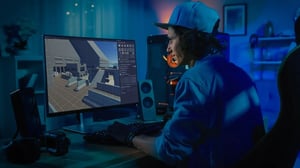
Game Designer
TABLE OF CONTENTS
- What does a game designer do?
- Game designer job description
- How much does a game designer make?
- Skills required to become a video game designer
- What software and tools do game designers use?
- How to become a game designer
- Where to find game design internships:
- Tips to break into the game programming industry
- Industry Pathways
What does a game designer do?
Game designers focus on the function of a game, creating systems, rules, and gameplay, and help with world-building (story and IP) to ensure it’s playable, fun, and engaging. They oversee both the foundation and execution of the game mechanics and overall user experience.
Game designers need to be highly technical and very adept at solving complex problems on a daily basis.
The job description of a Game Designer can differ slightly depending on the size and type of a project, and the studio. Typically, as games become more complex and teams become larger, some of the traditional roles of a Game Designer are separated out into specializations such as a Level Designer and/or a Systems Designer.
Level Designers focus on creating and implementing levels, environments, stories, and quests, while Systems Designers focus on designing and then implementing the minute-to-minute gameplay systems which make the game fun like controls, movement, and combat.
Game designer job description
A game consists of many different gameplay features and mechanics, which operate in conjunction with each other to give the player a better gaming experience. Game Designers are responsible for making sure all those features and mechanics work cohesively and engagingly to help keep players entertained.
Troy Dunniway, award-winning Game Designer and CG Spectrum Mentor, outlines the most important responsibility of a game designer:
"As a game designer, you first and foremost need to be a master of HOW to make a game or level FUN, interesting, compelling, and something a player would want to play."
A game designer today could take on a number of specializations. Some focus on combat balance, using spreadsheets and simulations to provide challenges without impossibility. Others are writers and/or world directors who focus on player experience. Others hone in on game controls, trying to make them responsive and meaningful to players. Some game designers can even take on more Creative Director roles where it’s their responsibility to impart the game’s vision to other team members so that there is consistency and quality across all parts of the game.
Role & responsibilities of a game designer in the gaming industry:
- Conceptualize, implement, and maintain gameplay systems that achieve a fulfilling flow state, addictive game loops, and a risk/reward balance
- Developing the storyline, character back-stories, and dialogue, through scripts and storyboards, including any relevant research
- Create and maintain comprehensive documentation (such as design outlines, diagrams, and visual mockups) that details the triggers, interactions, and subsequent events of specific features or aspects of gameplay
- Work closely with User Experience (UX) and User Interface (UI) Designers to optimize the player interface
- Building levels and environments
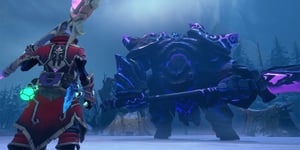
How much does a game designer make?
Game Designer’s average salary per year will be around USD $88,000. Entry-level yearly wages start at around the USD $66,000 mark, with top-end yearly salaries (usually requiring years of experience) reaching around USD $123,000.
Skills required to become a video game designer
Game designers require a balance of creative and technical skills to bring a game concept to life. They usually don’t need to be super technical, but this role does require a good understanding of some of the basic aspects of technical game design and game programming. A degree in computer science, or similar, can also be useful but is not always necessary.
Video game studios may look for the following skills in game designers:
- Possess a great understanding of game levels, level layouts, drawing maps, architecture, and other design areas related to game level design.
- An ability to break things down into systems
- Ability to use data to get qualitative information to affect your designs
- Have a good understanding of technical implementation within games, scripting languages, syntax, and other basic programming concepts
- An understanding of marketing and market research to understand what your target audience wants and how to sell it to them
- Basic to advanced drawing skills to communicate ideas visually
- Basic understanding of 3D art, modeling, texturing, rigging, animation, and other areas of 3D art creation, use, and conversion
- Basic to advanced knowledge of user interface (UI/UX) in games
What software and tools do game designers use?
Game designers are required to drive the technical needs of the game using industry-standard computer software and the platforms that support them.
Game designers may need knowledge of a combination of the following software:
- Game Engine (Unity 3D, Unreal Engine or another)
- Microsoft or Google Office Software for documents, spreadsheets & presentations
- Art software (Like Adobe Photoshop & Illustrator) for a wide assortment of visual design, flowcharting, mind mapping
- Jira & Bug Tracking Software
- Scripting Languages & Tools (Python, LUA, C#, Unreal Script, Blueprints)
- Programming languages C++ and Python are also commonly used

Unreal Engine is a 3D computer graphics game engine developed by Epic Games, first showcased in the 1998 first-person shooter video game Unreal
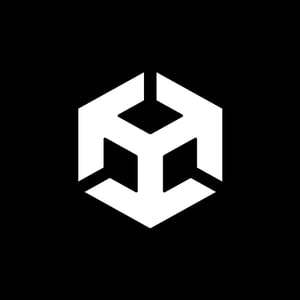
Unity is a cross-platform game engine developed by Unity Technologies, first announced and released in June 2005 at Apple Worldwide Developers Conference
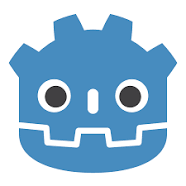
Godot is a cross-platform, free and open-source game engine released under the permissive MIT license
How to become a game designer
Here are some sure-fire strategies to help increase your chances of getting a job in game design.
Get the skills
Look at game studio job ads to see the skills they’re hiring for. Then build those skills: download and learn relevant software, watch online tutorials, or enroll in an industry-focused course.
Stay ahead of trends
Seek out online tutorials, webinars, conferences, publications, and other game programming content to remain informed. See our resource section.
Create your own games
A great way to understand the rigors of game dev and showcase your talent and basic grasp of game production for potential recruiters.
Participate in game jams
A team challenge to produce a game in 24–72 hours, with participants taking on various roles. Gain experience, collaborate, and work towards a deadline. Use the final product in your reel.
Engage with communities
Building connections is vital to getting your name and skills recognized, and a chance to interact with industry pros who can offer advice or even jobs.
Intern at a game studio
Not always a viable option, but it can be a great way of gaining hands-on experience while also networking.
Where to find game design internships:
- 2K
2k.com/en-US/jobs - ACTIVISION
careers.activision.com/students - BANDAI NAMCO
bandainamcoent.com/careers - BLIZZARD
careers.blizzard.com/global/en/internships - EA
ea.com/careers/interns-and-university-graduates - EPIC GAMES
epicgames.com/site/en-US/earlycareers - FAST TRAVEL GAMES careers.fasttravelgames.com/#jobs
- IO INTERACTIVE
ioi.dk/careers - MICROSOFT
careers.microsoft.com/us/en/gamingjobs
- ORBITAL KNIGHT
orbitalknight.com/careers - RIOT GAMES
riotgames.com/en/university-programs - ROBLOX
careers.roblox.com - ROCKSTAR GAMES
rockstargames.com/careers - RESPAWN ENTERTAINMENT
respawn.com/internships - ROVIO
rovio.com/interns - SEGA
recruit.sega.jp/en/internship - SUPERCELL
supercell.com/en/careers - THE FARM 51
thefarm51.com/eng/careers

Ready to Start Your Film & Games Journey?
Download our course guide to see how we can help you on your pathway to your dream career.Tips to break into the game programming industry
Use the networking opportunities available to programmers and game devs to build up your contacts. This can be one of the best ways to get a job. Searching online, you can find many industry meetups and events, which often include guest speakers like professional artists and software creators. The knowledge gained by listening to these types of guest speakers talk about their personal experiences is irreplaceable.
Don't for get to check out our interview with Ubisoft AI programmer Firas Hosn.
Get a QA job
Kick-start your career with a job in Quality Assurance. Expand your gaming knowledge by testing and pushing in-production games to their limits.
Collaborate with peers
Working with your peers is fun, you can learn from each other and tackle bigger projects.
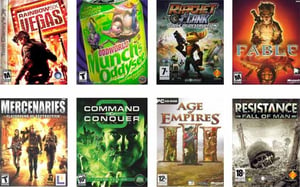
Industry Pathways
Troy Dunniway, Game Design Department Head at CG Spectrum, shares why game design is the perfect career for people who are continuously curious and are looking for a way to merge all their interests together, in a balance between the technical and the artistic. Plus, find out what a day in the life of a Level Designer looks like!


